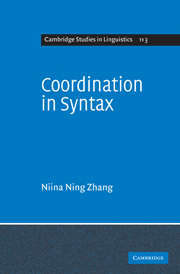Book contents
- Frontmatter
- Contents
- Acknowledgments
- Abbreviations
- 1 Introduction
- PART I NO SPECIAL SYNTACTIC CONFIGURATION
- PART II NO SPECIAL SYNTACTIC CATEGORY
- PART III NO SPECIAL SYNTACTIC CONSTRAINT
- 4 The Conjunct Constraint and the lexical properties of coordinators
- 5 The Element Constraint and the semantic relatedness of conjuncts
- 6 Three puzzles solved by rejecting the CSC
- 7 Relativized parallelism in syntactic complexes
- PART IV NO SPECIAL SYNTACTIC OPERATION
- 10 Conclusions
- References
- Index
6 - Three puzzles solved by rejecting the CSC
from PART III - NO SPECIAL SYNTACTIC CONSTRAINT
Published online by Cambridge University Press: 04 August 2010
- Frontmatter
- Contents
- Acknowledgments
- Abbreviations
- 1 Introduction
- PART I NO SPECIAL SYNTACTIC CONFIGURATION
- PART II NO SPECIAL SYNTACTIC CATEGORY
- PART III NO SPECIAL SYNTACTIC CONSTRAINT
- 4 The Conjunct Constraint and the lexical properties of coordinators
- 5 The Element Constraint and the semantic relatedness of conjuncts
- 6 Three puzzles solved by rejecting the CSC
- 7 Relativized parallelism in syntactic complexes
- PART IV NO SPECIAL SYNTACTIC OPERATION
- 10 Conclusions
- References
- Index
Summary
Introduction
In the last two chapters, I argued that neither the CC nor the EC is a constraint on syntactic operations. The CSC is thus not part of the computational system. Getting rid of an ad hoc stipulation is desirable by itself, but rejecting this particular stipulation also allows us to improve our understanding of some hitherto puzzling facts about natural language. In this chapter, I show what we gain if we give up the CSC. Specifically, I examine three constructions that seem to be in conflict with certain basic syntactic laws observed elsewhere. The first construction seems to conflict with principles of selection, theta-role licensing, and syntax–semantics mapping, the second with principles governing the syntactic relation between elements and their shared modifier, and the third with principles governing the launching site of certain movement operations. Postal (1998) ends his book by stating that the third of these constructions raises such serious challenges for syntactic theory that they can only be avoided by denying that the construction actually exists. However, as I show in this chapter, if we give up the CSC, all three of the constructions can be derived in accordance with standard principles. Thus, abandoning the CSC may actually strengthen the explanatory power of syntactic theory.
Each of the three remaining sections in this chapter is devoted to one of these three constructions, which I will call Split Argument Constructions, Modifier-Sharing Constructions, and Interwoven Dependency Constructions.
Information
- Type
- Chapter
- Information
- Coordination in Syntax , pp. 141 - 176Publisher: Cambridge University PressPrint publication year: 2009
Accessibility standard: Unknown
Why this information is here
This section outlines the accessibility features of this content - including support for screen readers, full keyboard navigation and high-contrast display options. This may not be relevant for you.Accessibility Information
- 1
- Cited by
